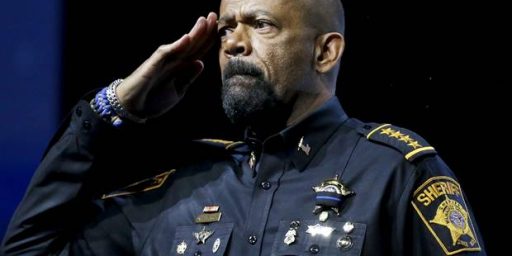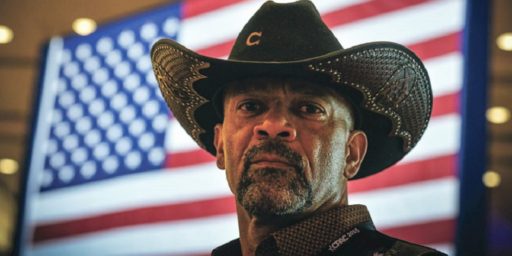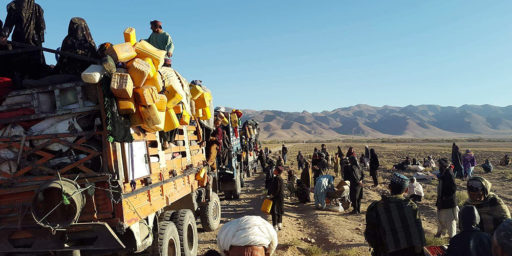Bush, Clinton Varied Little on Terrorism
WaPo: Bush, Clinton Varied Little on Terrorism
For all the sniping over efforts by the Bush and Clinton administrations to thwart terrorism, information from this week’s hearings into the Sept. 11, 2001, attacks suggests that the two administrations pursued roughly the same policies before the terrorist strikes occurred.
Witness testimony and the findings of the commission investigating the attacks indicate that even the new policy to combat Osama bin Laden and his Taliban hosts, developed just before Sept. 11, was in most respects similar to the old strategy pursued first by Clinton and then by Bush.
The commission’s determination that the two policies were roughly the same calls into question claims made by Bush officials that they were developing a superior terrorism policy. The findings also put into perspective the criticism of President Bush’s approach to terrorism by Richard A. Clarke, the former White House counterterrorism chief: For all his harsh complaints about Bush administration’s lack of urgency in regard to terrorism, he had no serious quarrel with the actual policy Bush was pursuing before the 2001 attacks.
Clearly, terrorism wasn’t the main thing on the plate for the Bush team before 9/11–it wasn’t even #1 on the foreign policy agenda. Then again, they’d only been in office eight months and were seriously hampered in getting a team in place by the lengthy attempts by Gore and company to overturn the election results. Further, it now seems unlikely to me that the Bush team’s reaction to something like the Cole attack would have been as tepid as the Clinton response.
But Deputy Secretary of State Richard L. Armitage, testifying this week in place of Rice, who declined to give public testimony to the commission, said there was “stunning continuity” in the transition from Clinton to Bush. “We made the determination under the guidance of Dr. Rice and the president to vigorously pursue the policy which we inherited while developing our own approach,” he said.
The Bush administration’s approach, which was in draft form by Sept. 4, 2001, did not differ substantially from Clinton’s policy. The commission staff, in the “key findings” it released this week, said: “The new administration began to develop new policies toward al Qaeda in 2001, but there is no evidence of new work on military capabilities or plans against this enemy before September 11” — a point on which Armitage concurred.
The primary differences in the Bush proposal were calls for more direct financial and logistical support to the Northern Alliance and the anti-Taliban Pashtuns and, if that failed, to eventually seek the overthrow of the Taliban through proxies. The plan also called for drafting plans for possible U.S. military involvement, according to testimony and commission findings.
It’s unclear to me what policies would have looked different behind the scenes. Clearly, there would have been no public support for launching a war to overthrow the Taliban simply out of the blue; that wasn’t on the table.
Former Clinton aides feel vindicated. Daniel Benjamin, a Clinton administration National Security Council official, said that “after seven months of chewing on it, they reached essentially the same conclusions as the previous administration” and did not have the funding in place to support more aggressive policies.
But Clarke, who was counterterrorism director for both Clinton and Bush, has been much more critical of Bush. In testimony this week, he said al Qaeda and terrorism “were an extraordinarily high priority” and there was “certainly no higher a priority” under Clinton. On the other hand, he said, “the Bush administration in the first eight months considered terrorism an important issue but not an urgent issue.”
In fact, Clarke was constantly agitating for a more aggressive response to terrorism from the Clinton administration, including more significant bombing of al Qaeda and Taliban targets. The commission staff described him as “controversial” and “abrasive” and included an observation that several Clinton colleagues wanted him fired.
“He was despised under Clinton,” said Ivo H. Daalder, who worked under Clarke in the Clinton National Security Council on issues other than terrorism. James M. Lindsay, who also worked under Clarke, concurred that people “thought he was exaggerating the threat” and said he “always wanted to do more” than higher-ups approved.
Daalder and Lindsay say Clarke’s criticism of Bush is based on the administration’s emphasis, not its policy. “His criticism of Bush pre-9/11 is not necessarily that they didn’t have a good strategy but that they didn’t take the threat sufficiently seriously.”
It’s very strange to me that the Clinton folks despised Clarke, ignored many of his recommendations for eight years, the opportunities to act occured entirely under that Administration, and yet his anger is directed at the Bush team. I’m not sure what to make of that.





http://www.weeklystandard.com/Content/Public/Articles/000/000/003/920ygass.asp?pg=1
OT: very good article
WOW! Only the media could say that “rolling back” the Taliban (Clinton) and “eliminating the Taliban” (Bush) were the same policies.
Now, maybe I’m a simpleton, but deciding to overthrow a foreign government is kinda a wee bit important difference in policy. (but maybe that’s just me.)
Clarke is proving himself to more and more a stooge. Over the last 3 years he has said everything from Clinton ignored terrorism all the way to it was Clinton’s biggest issue. (and everywhere in between) He has also said the exact same things about Bush.
I find it funny that the only people that find him credible conveniently only find him credible on his criticism of Bush but not the praise and the praise of Clinton but not the criticism.
Life really is simple when you have no intellectual honesty.
Charles Krauthammer: “Clinton had one justification after another for going on the offensive: American blood spilled in the 1993 World Trade Center attack, the embassy bombings of 1998, the undeniable act of war in the attack on the USS Cole in 2000.”
Start listening to yourselves. Launching a war out of the blue? Opportunities to act disappeared with a change of administrations?
On Jan 19, 2001 the Navy panel investigating the Cole concluded that it was not an act of terrorism. That’s right, as Krauthammer kindly points out, it was an undeniable act of war. Clinton had presidential pardens to prepare. He failed. Clarke didn’t say, “Listen to me, we are at war.” He failed. Bush fiddled. He failed.
Clarke, at least, seems to have recognized the escalation. Where would it lead next?
Now we get to the heart of the matter. All the accumulated experience – the failures, the lessons learned, the understanding of the world as it was – was tied up in the bureaucrats and Clarke was an essential link between what the new administration brought to the table and the real world. Clarke was quite literally indispensible, but dispense with him they did. Why wasn’t the pattern of attacks sufficient to heed Berger’s and Clarke’s warning that the most immediate threat came from non-state actors?
Sure, they had plans. They had a plan to parcel out Iraq’s oil assets. What they didn’t have was a plan to address the next in a long history of attacks in an escalating war. That’s where Clarke comes in. And now he’s mad. Damn right. Clearly, no one took this war seriously. But Clarke at least could sense the increasing seriousness, increasing urgency, and the increasing liklihood that this was going to get ratcheted up a notch. But the administration was dismissive, paid lip service to the ineffective policies of their predecessor, and turned a blind eye to the ramifications of the Cole inquiry’s findings that the war was on. The justification to pick up this ball and run with it was staring them straight in the face.
So what was it about the new policy objectives that were so overriding that the primary piece of advice given to the incoming administration was not worth immediate attention. Why did this ‘comprehensive’ plan for eliminating al Qaeda fail to account for the escalating pattern of attacks? Policy implementation would take time. Meanwhile, there were people saying we had urgent matters unrelated to policy.
Clarke was quite literally indispensible…
Simpleton you need to consider a moniker change to “gullible.”
I am an Independant, and I have only one comment:
It’s unfortunate that Clarke (and his publishing company) decided to move the publish date of his book to coincide with his testimony. Didn’t they think for ONE SECOND how that might damage his credibility, dilute his message and give the Republicans raw meat to grind? DUMB DECISION! Plus, it only adds to all the flaming and high emotions!
I was reading the excellent essays at ElectionAnalysis.com and even though they try to present a balanced approach, there is STILL a lot of emotion in the mix.
And I have to say- IF Clarke did offer inconsistant testimony at that earlier hearing, then his credibility may be damaged beyond repair, and his whole package is subject to skepticism. Again- didn’t anyone advise him to “keep his story straight?”
As an independant with a lot of integrity, I want only the truth, and I am tired of all the propaganda, lies and distortions that BOTH sides are using to promote their candidate! Let’s put it ALL on the table, 100% TRUTH and let the people decide!
Well, for one thing Clarke’s book was under review by the White House for 3 months. They may have held on to it so that the release would coincide with hearings. They knew they would have to deal with it sometime and for all anyone can say they might have felt this was as good as time as any.
As far as Clarke’s supposed contradictions, that’s just people talking. He was a surrogate for the administration. What he presented on behalf of the administration was the administration’s position. What he wrote in his book was his. It’s not possible for there to be a contradiction. If the GOP wants to start declassifying things, what they’ll find is that the administration’s position, made through any number of surrogates, did not present the whole truth.
You’ll notice that the backgrounded matches current administration claims. It was probably written up after the fact by the press team. Think of it as an embellished resume. You sort of did X. It certainly sounds more impressive. But the reality is somewhat less flattering. And you can get away with because the interviewer has no way of verifying the truth or falsity of your claim.
Paul was correct, simpleton, “gullible” would indeed be more appropriate.
It was probably written up after the fact by the press team.
Who’s been feeding you this crap? There were actual people present for that backgrounder. Reporters. And there’s a recording in Clarke’s voice, which I’ve heard on the radio for the past three days, which matches the transcript.
It’s time to pull your head out of the sand. Or whatever dark place you’ve got it shoved up into.
Sheesh.
I believe what Simpleton is trying to say (appropriately enough) is, “it’s all about the oooooiiiilll.”
Boyd, you’re referring to the 2002 background-briefing-to-reporters transcript – the still-classified under-oath hearings under discussion are hardly on the radio yet. See here:
http://oxblog.blogspot.com/2004_03_21_oxblog_archive.html#108036956210557258
They may prove damaging – or maybe not really. Too early to tell.
Just for fun.
Rice: and it was a map of Afghanistan
McClellan: and it was a map of Afghanistan
Rice: that was rolled out on the table
McClellan: that was rolled out on the table
http://www.comedycentral.com/mp/play.php?reposid=/multimedia/tds/headlines/8117.html
For instance, in January, 2002, O’Neill was coached to praise Saudi cooperation on terror financing in a memo from his press aide, Michele Davis. Behind the scenes, in fact, O’Neill and senior officials from the State Department and CIA were profoundly frustrated by the Saudis unwillingness to assist America at its time of crisis.
http://thepriceofloyalty.ronsuskind.com/thebushfiles/archives/000089.html
But, you know, after reading some of the comments here I’ve pretty much been convinced of the unalloyed goodness and rightness of the President and those “in the loop.” I realize that I’ve been missing the bigger picture: that there is evil. I feel blessed to have a leader so resolved to ‘smoke out’ the evil people in this world. I’m particularly appalled by the hordes of evil people this nation has serving at seemingly every level of government, and the President’s ability to flush these people out the system (and down the toilet) gives me great comfort.
And I’m quite convinced that history and document declassification will demonstrate an unparalleled faithfulness to the unvarnished truth. So much so, that I’ve identified the totality of my being to this beacon of light. I must admit, under the weight of mounting contrary evidence to my previously held beliefs I was thrust into the abyss of mortal existential crisis. So I quickly consulted with Lileks, InstaPundit and NRO; and they pulled me through and gave me the faith I was lacking. My days of skepticism and cynicism are over.
Only an extraordinary apologist could say something like this: then again, they’d only been in office eight months and were seriously hampered in getting a team in place by the lengthy attempts by Gore and company to overturn the election results. It’s clear that Bush’s ‘victory’ did not reflect the wishes of the electorate; he should not have won the election at all (the 40k Florida votes that were illegally blocked alone would have tilted the balance, not to mention the butterfly ballots and “hanging chad” issues). That detail aside, the election stuff was over well before Bush was sworn in. Any attempt to connect Bush’s decisions to electoral irregularities is simply laughable.
Dondo,
Bush narrowly won Florida on the first count, the second count, and the last count. Regardless, it’s simply a fact that Gore’s attempt to overturn the result–even if properly motivated–delayed Bush getting his team in place by several weeks.
Well, it will be interesting when Condoleezza Rice testifies. Although we have probably already heard most of what she has to say, this will get HUGE attention, and will allow a more focus and consice representation of her side of the story.
Even more interesting will be the way the press will probably report it.
CNN: The evil Dr. Rice was finally dragged before the committee, where more of her criminal cover up was spewed……..
LIMBAUGH: The lovely and gracious Condoleezza Rice gave devestating testimony today…..
ESPN: What a babe.
LA-TIMES: Who?
—